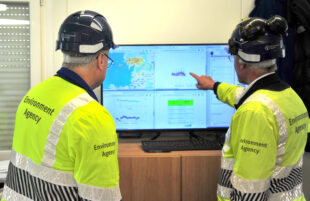
There can be no doubt that onshore oil and gas (fracking) is controversial and emotive. Fracking policy is a matter for the government. As a regulator, the Environment Agency’s role is to ensure that fracking can only go ahead if it is safe for people and the environment.
Our regulatory process – permitting, inspecting, monitoring and enforcement – is based on sound science and is designed to protect our water, land and air, and the people and wildlife that depend on them. So we will not allow any activity that could pollute water (rivers and streams, surface water, groundwater, drinking water) or any removal of water if it could affect the public water supply or damage the environment. We ensure waste material is minimised, stored, and disposed of safely so it doesn’t harm the soil or the wider environment. And we protect the air by requiring that any waste gas is burnt in a safe and controlled way, and that any methane emissions - which can contribute to climate change - are minimised and monitored.
My research team has been working for several years now to provide the evidence needed to support the Environment Agency’s regulation of onshore oil and gas. We’ve assessed the risks that the range of chemicals that might be used as fracking fluids pose to the environment. We have developed new methods for assessing groundwater vulnerability that work in UK conditions. We’ve looked at methane in groundwater and air emissions from abandoned sites, and monitored the background air quality near proposed sites so that we can identify any impact from fracking operations in the future. Our reports on this work are all freely available to anyone who is interested.
Our latest reports – out this week – cover a similarly wide range of subjects. They all contribute to a better understanding of the risk from onshore oil and gas to air, land and water.
We’ve developed statistical approaches for understanding the natural variability in baseline conditions, especially for water and air quality. Being able to understand whether a measurement is outside the normal range is essential when trying to identify changes with confidence.
We’ve also looked at ways to understand micro seismic events (“mini-earthquakes”) so we can spot those that may be signals of more significant change. We’ve reviewed the software used to monitor fracking to understand how well it works in a UK context. We’ve examined the potential for using a new approach to assess the effectiveness of flaring – when waste gases are burnt to reduce their impact on air quality and climate change. We’ve also looked at the impact of decommissioned onshore oil wells (yes, there are plenty from nearly a century of onshore oil drilling) on groundwater quality, and we’ve developed better methods for determining the vulnerability of deep groundwater to pollution.
There’s more to do, of course, as the overview of our recently published and ongoing work below shows. But we’re committed to scientific excellence to support the Environment Agency’s regulation of onshore oil and gas – and that means that the risks from existing and proposed sites will be managed and minimised.

Leave a comment